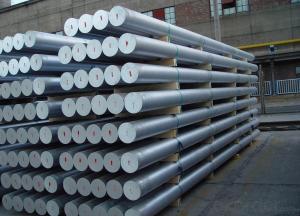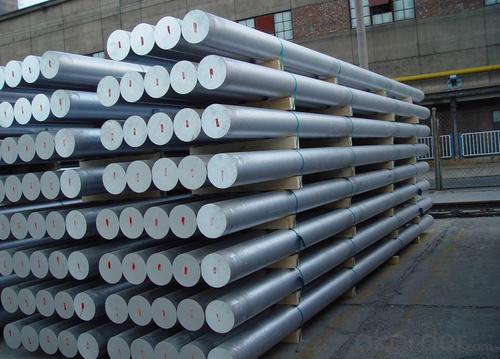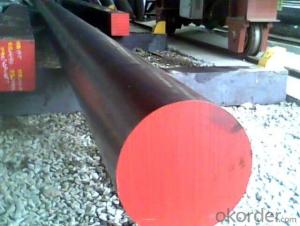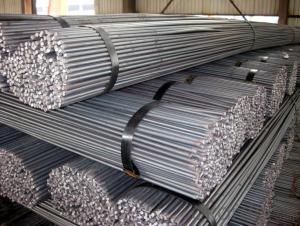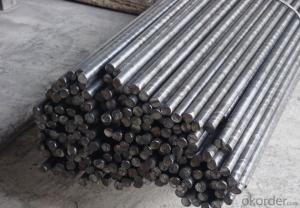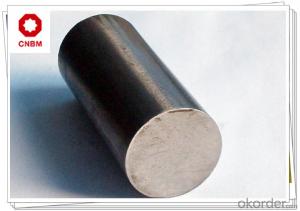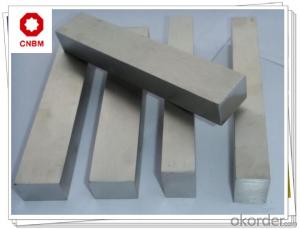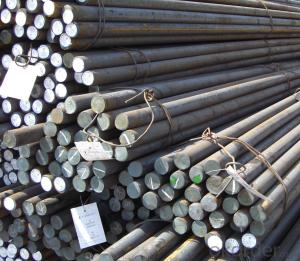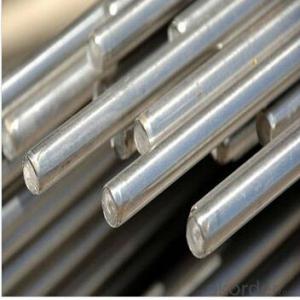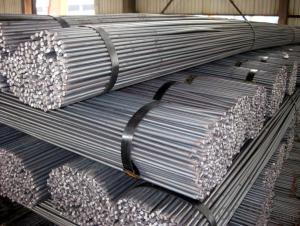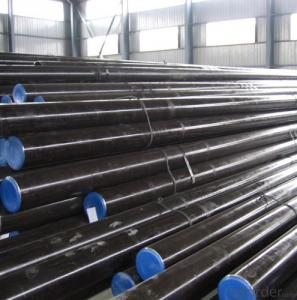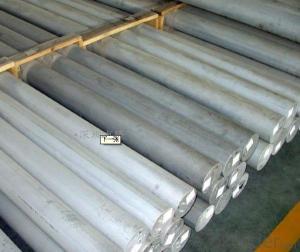Spring And Bearing Steel Of Round Bar Shape
- Loading Port:
- China main port
- Payment Terms:
- TT OR LC
- Min Order Qty:
- 25 m.t.
- Supply Capability:
- 5000 m.t./month
OKorder Service Pledge
OKorder Financial Service
You Might Also Like
Grade | AISI 52100, ASTM E52100, DIN 1.3505,JIS SUJ2, GCr15 |
Dimensions | Diameter: 30-60mm Length: 2000-13000mm or as required |
Shape | Round Bar |
Type | Alloy Steel Bar |
Delivery Condition | Black Surface |
Material | Bearing Steel |
Technique | Hot Rolled |
Usage and Applications
These steels are used for ball and roller bearing applications and are comprised of low carbon steels and high carbon through harden able steel.
First the famous 1C-1.5Cr steel from which the majority of bearings are made. Its structure is apparently well-understood and the focus is on purity in order to avoid inclusions which initiate fatigue during rolling contact. Then there is the M50 steel and its variants, from which bearings which serve at slightly higher temperatures in aeroengines are manufactured, based on secondary-hardened marten site.
Tapered roller bearing are generally used to support combined load mainly consisting of radial load. Their cups are separable for easy assembling ,During mounting and using, radial clearance and axial clearance can be adjusted and preloaded mounting can be made.
Packaging & Delivery
Packaging Detail: ASTM 52100 Steel in seaworthy packing or on customer request; Packed in bundles with standard export sea-worthy package or as customer require
Delivery Detail: 45 days after confirmed
Trade terms: FOB, CFR, CIF ou as customer's required
MOQ: 25 tons or at customer's demands. If the quantity is good, the price will be better.
Processing of Bearing Steel Round Bar
The processing of Bearing Steel Round Bar is hot rolled (strictly control sulphur, phosphorus and non-metallic inclusions content and distribution)
Chemical Composition of Bearing Steel Round Bar
C | Si | Mn | Cr | Ni | Cu |
Equal or less than | |||||
0.95-1.05 | 0.15-0.35 | 0.25-0.45 | Cr:1.40-1.65 | 0.30 | 0.25 |
All products' chemical composition and specification can be design according to customers' requirement.
Note
1. According to national standard (GB) for our products, if not, supply according to national standards (GB) or agreement.
2. We can not only provide electric furnace +LF+VD and electros lag re-melting (ESR) steel forging materials, but also forging products of piece, bar, etc.
3. Our company is equipped with roll equipment and can provide our customers with roll billets or finished.
4. Please send us your detailed specifications when inquire. We will reply to you ASAP.
5. Certificate of quality is issued in English, in addition the normal terms, production process, the mechanical property (yield strength, tensile strength, elongation and hardness. forged ratio, UT test result, Grain size, heat treatment methods and the sample of is shown on the certificate of quality.
- Q: Are steel round bars suitable for aerospace applications?
- Indeed, aerospace applications can find steel round bars to be suitable. Steel is renowned for its exceptional strength, durability, and resistance against corrosion, making it highly valued in the aerospace sector. Various aerospace components and structures, including landing gear, engine components, and structural supports, can benefit from the utilization of steel round bars. Nevertheless, it is crucial to acknowledge that the precise grade and composition of the steel round bars must adhere to the exacting requirements and standards established by the aerospace industry. Moreover, weight reduction endeavors and the integration of advanced materials like titanium and composites are also taken into account when considering aerospace applications.
- Q: What are the advantages of using niobium-alloy steel round bars?
- Niobium-alloy steel round bars offer numerous benefits. Firstly, they possess exceptional strength and toughness. By incorporating niobium, the steel's strength increases while maintaining its ductility, making it ideal for applications requiring durability and high strength. Consequently, these round bars can withstand heavy loads and shocks without deforming or breaking easily. Secondly, niobium-alloy steel exhibits high resistance to corrosion. Consequently, it proves suitable for use in harsh environments where exposure to moisture, chemicals, or corrosive substances is common. The corrosion resistance ensures that the round bars remain intact and retain their structural integrity over time, reducing the need for frequent replacements and maintenance. Moreover, niobium-alloy steel demonstrates excellent weldability and formability. It can be effortlessly welded and fabricated into various shapes and sizes, making it adaptable to different manufacturing processes and applications. This adaptability enables the production of custom-designed round bars that meet specific project requirements. Additionally, niobium-alloy steel possesses superior heat resistance properties. It can endure high temperatures without losing strength or experiencing significant changes in its mechanical properties. Thus, it proves suitable for applications involving exposure to extreme heat or thermal cycling, such as in the aerospace or automotive industries. Furthermore, niobium-alloy steel is renowned for its exceptional fatigue resistance. It possesses a high endurance limit, enabling it to withstand repeated loading and unloading cycles without experiencing fatigue failure. This quality makes niobium-alloy steel round bars ideal for applications involving dynamic or cyclic loading, such as in structural components or machinery. In conclusion, the utilization of niobium-alloy steel round bars grants advantages such as high strength, corrosion resistance, weldability, formability, heat resistance, and fatigue resistance. These properties make niobium-alloy steel a reliable and cost-effective choice for numerous industries and applications.
- Q: Are steel round bars resistant to chemicals?
- Steel round bars can exhibit varying degrees of resistance to chemicals, depending on the specific type of steel and the type of chemical involved. Stainless steel round bars, for example, are known for their excellent resistance to a wide range of chemicals, including acids, alkalis, and various organic compounds. This is due to the high levels of chromium present in stainless steel, which forms a protective oxide layer on the surface, preventing corrosion and chemical attack. However, not all steel round bars possess the same level of chemical resistance. Carbon steel round bars, for instance, are more susceptible to corrosion and chemical attack compared to stainless steel. Carbon steel can be affected by acids, alkalis, and other corrosive chemicals, especially in highly corrosive environments. In such cases, additional protective measures such as coatings or treatments may be necessary to enhance chemical resistance. In summary, while stainless steel round bars offer excellent resistance to chemicals, carbon steel round bars may require additional precautions to protect against chemical corrosion. It is important to consider the specific type of steel, the type of chemical, and the environmental conditions when assessing the chemical resistance of steel round bars.
- Q: Are steel round bars suitable for construction applications?
- Yes, steel round bars are commonly used in construction applications due to their high strength, durability, and versatility. They are well-suited for structural components such as beams, columns, and reinforcement in concrete structures. Additionally, their availability in various sizes and grades makes them suitable for a wide range of construction projects.
- Q: What is the maximum length of a steel round bar?
- The maximum length of a steel round bar can vary depending on several factors such as the diameter of the bar, the manufacturing capabilities of the steel supplier, and the transportation limitations. Generally, steel round bars are produced in standard lengths that range from 6 to 12 meters (20 to 40 feet). However, it is possible to manufacture longer bars through special processes or by joining multiple bars together using welding techniques. In some cases, steel round bars can be custom-made to exceed standard lengths, but this would require specific arrangements with the supplier and considerations for logistics and handling during transportation. Ultimately, the maximum length of a steel round bar is determined by practical limitations and the specific requirements of the project or application.
- Q: What is the maximum hardness achievable for steel round bars?
- The maximum hardness achievable for steel round bars depends on various factors such as the specific type of steel used, the heat treatment process applied, and the desired properties. However, in general, the maximum hardness achievable for steel round bars is typically around 60-65 HRC (Rockwell hardness scale) for high carbon steels, and can be even higher for certain specialty alloys or through additional surface treatments.
- Q: Can steel round bars be used in the production of tools?
- Yes, steel round bars can definitely be used in the production of tools. Steel is widely used in tool manufacturing due to its excellent strength, durability, and versatility. Steel round bars, in particular, are commonly utilized for their ability to be machined, forged, and heat-treated into various tool components such as cutting edges, shafts, handles, and dies. The high tensile strength and resistance to wear and corrosion make steel round bars an ideal choice for tool production, ensuring the longevity and performance of the tools. Additionally, steel can be easily customized and shaped to meet the specific requirements of different tools, making it a preferred material in the industry.
- Q: Is round steel round steel?
- Round bar is divided into three parts: hot rolling, forging and cold drawing. Standard Specification for hot rolled round steel is 5.5-250 mm. Of which: 5.5-25 mm small round bars are mostly supplied by straight strips. They are used as reinforcing bars, bolts and various mechanical parts. Round bars larger than 25 millimeters are used mainly for making mechanical parts or for seamless steel tubes.
- Q: Can steel round bars be used in the hydraulic industry?
- Yes, steel round bars can be used in the hydraulic industry. Steel round bars are often used in the manufacturing of hydraulic cylinders, pump shafts, and various hydraulic components due to their high strength, durability, and resistance to corrosion.
- Q: Can steel round bars be used for making engine parts?
- Absolutely! Engine parts can indeed be made using steel round bars. In fact, steel round bars are commonly employed in the production of engine components. This is primarily due to their remarkable qualities such as exceptional strength, long-lasting nature, and ability to withstand extreme temperatures and corrosion. These bars can be skillfully shaped and resized to fashion a wide array of engine parts including crankshafts, camshafts, connecting rods, and valves. By utilizing steel round bars, the desired mechanical attributes and structural integrity necessary for optimal engine performance and reliability can be ensured. Furthermore, these bars can be subjected to heat treatment and surface treatment techniques to further augment their properties, rendering them incredibly suitable for engine applications.
Send your message to us
Spring And Bearing Steel Of Round Bar Shape
- Loading Port:
- China main port
- Payment Terms:
- TT OR LC
- Min Order Qty:
- 25 m.t.
- Supply Capability:
- 5000 m.t./month
OKorder Service Pledge
OKorder Financial Service
Similar products
Hot products
Hot Searches
Related keywords
